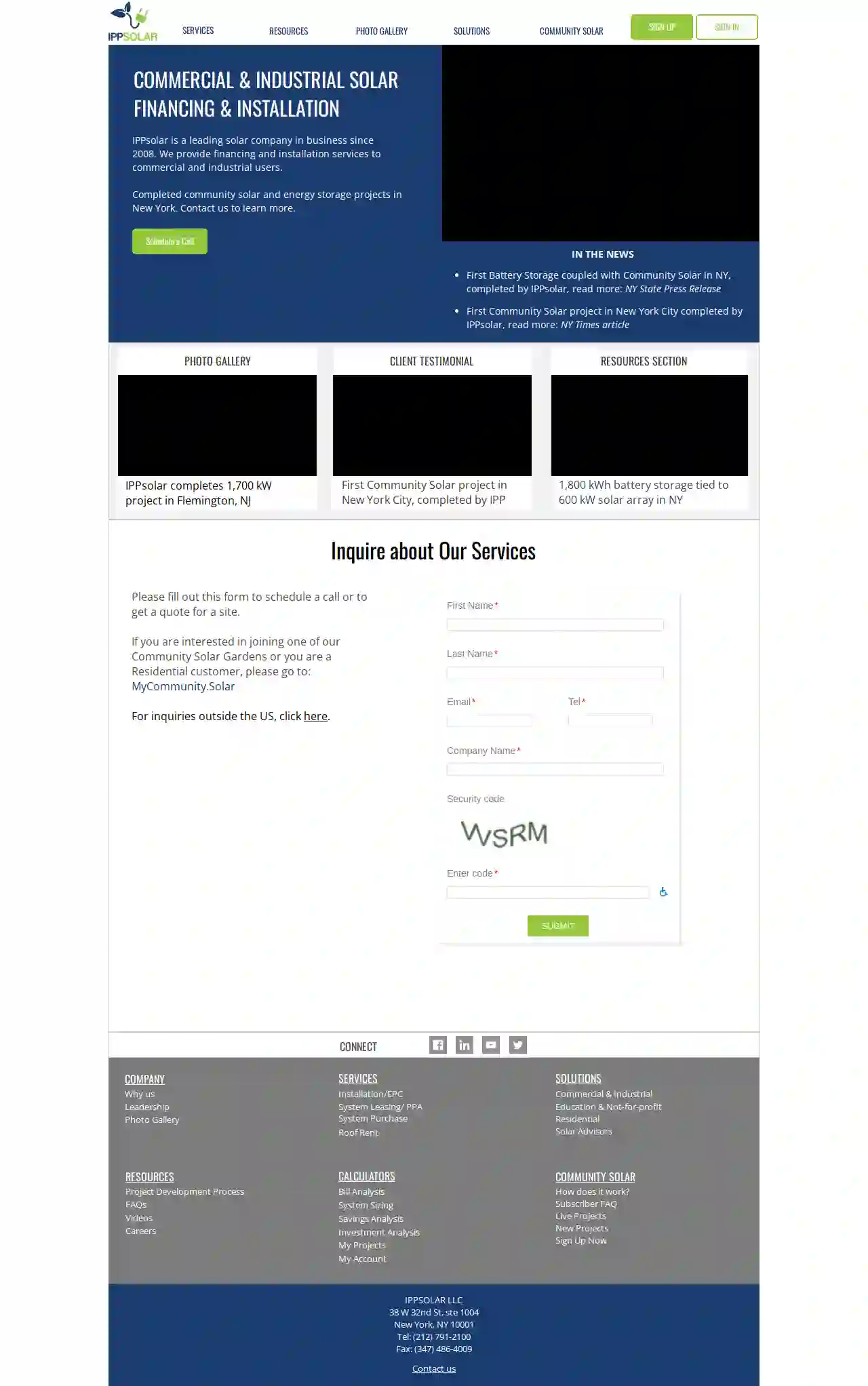Solar Installers Arlington Heights
Find Solar Panel Installation Near Me in Arlington Heights
Receive 3 FREE Residential Solar Installers quotes for your project today! Compare profiles, reviews, accreditations, portfolio, etc... and choose the best service.

AC Power, LLC
51 reviewsSuite 801, 915 Broadway, New York, 10010, USAC Power is a woman-owned solar development company committed to repurposing previously disturbed land for a brighter future through solar development. Our team overcomes the obstacles associated with these sites to successfully bring solar facilities into operation and return the property to revenue-generating use. AC Power is committed to working with transparency, collaboration, and integrity.
- Services
- Why Us?
- Testimonials
- Gallery
Get Quote
Solar Cents
123 Solar Street, Suite 101, North Haledon, NJ, 07508, USSolar Cents is a leading solar energy solutions provider, offering comprehensive services including solar installation, consulting, and financing options. With over 150MW of installed solar projects across the United States, they have established themselves as a reliable and efficient partner for businesses, non-profits, schools, universities, and faith-based organizations. Their team of seasoned experts delivers turnkey energy solutions, utilizing advanced technology and proprietary processes to reduce costs and increase the value proposition for clients. Solar Cents facilitates the development of commercial and industrial solar facilities, providing revenue and savings for property owners and tenants through solar project leases.
- Services
- Why Us?
- Accreditations
- Our Team
- Testimonials
- Gallery
Get Quote
Go Solar New Jersey
54 reviews3304 Sylon Blvd #2, Hainesport, NJ, 08036, USGo Solar New Jersey is a leading solar company dedicated to providing sustainable and green energy solutions to New Jersey residents. Our team of professionals offers comprehensive solar analysis, installation, and activation services, ensuring a smooth transition to solar power. We also provide resources on solar incentives, tax rebates, and programs designed to make solar energy affordable and accessible.
- Services
- Why Us?
- Accreditations
- Our Team
- Testimonials
- Gallery
Get Quote
New Jersey Sun Tech LLC
3.945 reviews187 Main St, 07095, USNew Jersey SunTech is a family-owned and operated company specializing in solar panels for home use with top-quality products and highly-rated solar installers. They provide clean and renewable energy, offer state incentives, and increase home value. Their solar solutions partners include top vendors in the solar power industry.
- Services
- Why Us?
- Accreditations
- Our Team
- Testimonials
- Gallery
Get Quote
Supreme Solar Services
554 reviews123 Solar Way, Suite 101, Lanoka Harbor, 08753, USSupreme Solar Services LLC is a small family-owned operated business established in 2018. We have been operating in the solar industry for over 12 years now. All technicians are professionally trained and must completed 500+ hours of solar apprenticeship before they are able to install on their own. We are based out of Ocean County new Jersey & service the entire state. We guarantee to provide best in class service as well as advise on the customers best interest not the companies. We put our customers & employees first.
- Services
- Why Us?
- Accreditations
- Our Team
- Testimonials
- Gallery
Get Quote
YSG Solar
3.5106 reviews79 Madison Avenue, 8th Floor, 10016, USYSG Solar is a leading provider of solar energy solutions, offering a range of services including residential solar, commercial solar, sleeved power purchase agreements, virtual power purchase agreements, battery storage, landowners, and community solar. With offices in New York and California, YSG Solar aims to help organizations save on energy costs and generate recurring revenue by hosting solar facilities. The company provides financing options, incentives, and rebates to make solar energy more accessible and affordable for its customers.
- Services
- Why Us?
- Accreditations
- Our Team
- Testimonials
- Gallery
Get Quote
IPPsolar
51 reviews38 W 32nd St, ste 1004, New York, NY 10001, 10001, USIPPsolar is a leading solar company in business since 2008. We provide financing and installation services to commercial and industrial users. Completed community solar and energy storage projects in New York. Contact us to learn more.
- Services
- Why Us?
- Accreditations
- Our Team
- Testimonials
- Gallery
Get Quote
GenRenew
4.452 reviewsFreehold, New Jersey, 912 Route 33, 07728, USGenRenew is a premier solar installer in New Jersey, providing solar installation services for commercial developers, residential sales organizations, and homeowners. They have been a Solar Power World Top Solar Contractor since 2017 and have serviced and installed thousands of systems in NJ, PA, NY, and IL since 2016. GenRenew offers a range of services including Electrical Services, EV Charging, Battery, Generators, and Solar Maintenance. They are committed to providing excellent customer service and have received numerous positive testimonials from satisfied clients.
- Services
- Why Us?
- Accreditations
- Our Team
- Testimonials
- Gallery
Get Quote
Solar Living Inc.
5111 reviewsP.O. Box 1174, Fair Lawn, 07410, USSolar Living, Inc. has been providing service, design, and installation of solar thermal pool heating and domestic hot water systems in the New York, New Jersey, and Pennsylvania area continuously since 1977. They stand behind every product they manufacture, sell, and install, and provide comprehensive warranties to all their customers, on both parts and labor.
- Services
- Why Us?
- Accreditations
- Our Team
- Testimonials
- Gallery
Get Quote
Geoscape Solar
4.834 reviewsFlorham Park, NJ, North Jersey Office, 30A Vreeland Road, 07932, USGeoscape Solar is a leading provider of solar energy solutions in New Jersey, with a vision to live in a world where renewable energy and storage systems replace fossil fuels. They offer customized solutions for each customer's energy needs, ensuring lower operating expenses and the fastest ROI for businesses. Geoscape Solar has two locations in the New Jersey metropolitan area and serves various industries including auto dealerships, agriculture, work spaces, places of worship, hotels & resorts, schools, and healthcare.
- Services
- Why Us?
- Accreditations
- Our Team
- Testimonials
- Gallery
Get Quote
Over 4,210+ Solar Installers registered
Our solar pros operate in Arlington Heights and surrounding areas!
SolarCompaniesHub has curated and vetted Top Solar Installers arround Arlington Heights. Find a reliable contractor today.
Frequently Asked Questions About Solar Installers
- Solar Panel Warranty: From the panel manufacturer, typically covering defects in materials and workmanship for 10-25 years. Some manufacturers offer performance guarantees, ensuring a certain level of energy output over time.
- Solar Installation Warranty: From the solar installer, covering the quality of the installation work for 1-10 years. This warranty protects you from leaks, faulty wiring, or other issues caused by improper installation.
- Your current energy usage
- The size of your solar system
- Your local electricity rates
- The amount of sunlight your panels receive
- Available net metering policies
What kind of warranty should I expect for my solar panel system?
Do I need planning permission to install solar panels in USA?
What happens if my roof needs to be replaced after I install solar panels?
How much can I save on my electricity bill with solar panels?
What kind of warranty should I expect for my solar panel system?
- Solar Panel Warranty: From the panel manufacturer, typically covering defects in materials and workmanship for 10-25 years. Some manufacturers offer performance guarantees, ensuring a certain level of energy output over time.
- Solar Installation Warranty: From the solar installer, covering the quality of the installation work for 1-10 years. This warranty protects you from leaks, faulty wiring, or other issues caused by improper installation.
Do I need planning permission to install solar panels in USA?
What happens if my roof needs to be replaced after I install solar panels?
How much can I save on my electricity bill with solar panels?
- Your current energy usage
- The size of your solar system
- Your local electricity rates
- The amount of sunlight your panels receive
- Available net metering policies